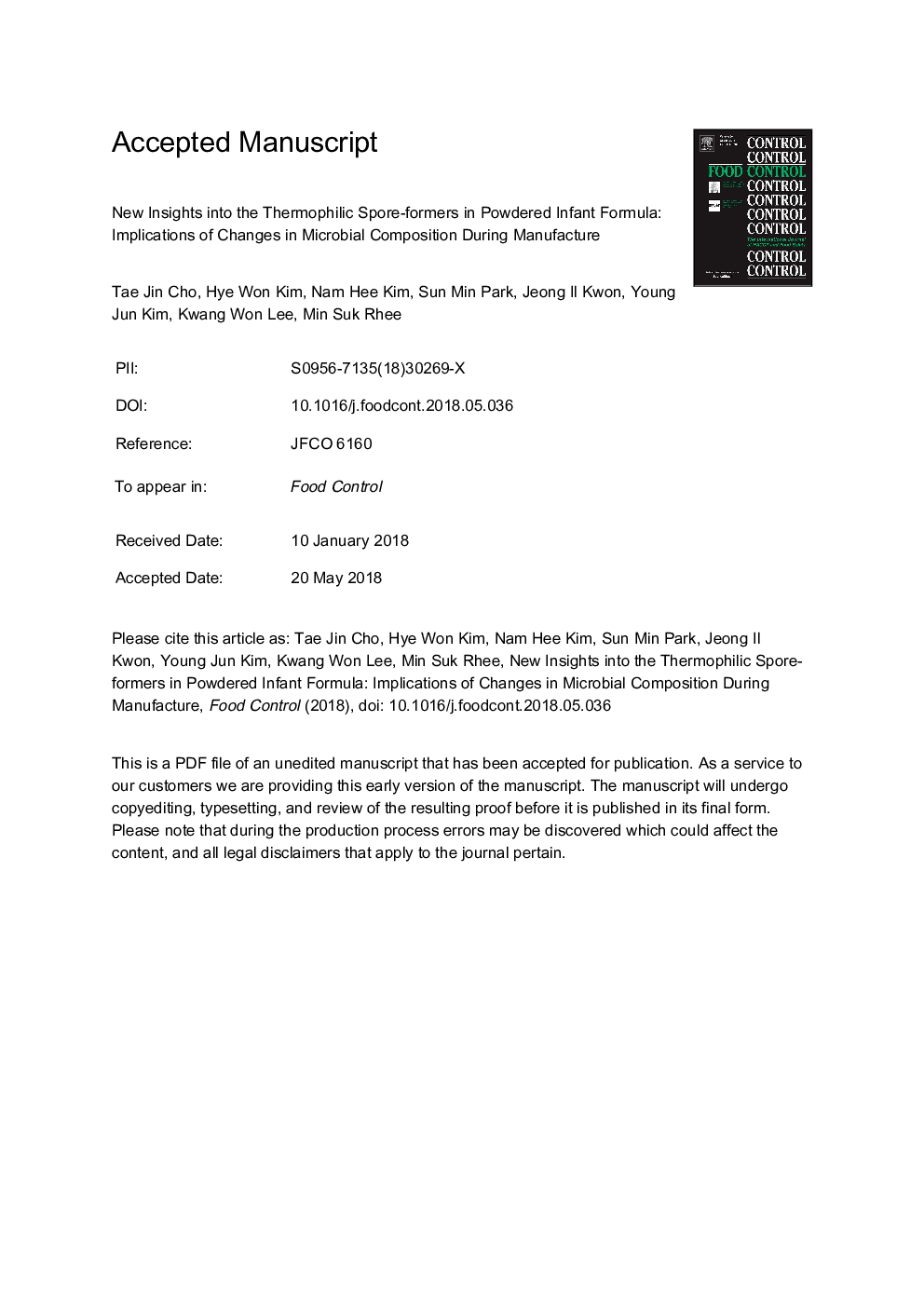| کد مقاله | کد نشریه | سال انتشار | مقاله انگلیسی | نسخه تمام متن |
|---|---|---|---|---|
| 8887861 | 1628372 | 2018 | 26 صفحه PDF | دانلود رایگان |
عنوان انگلیسی مقاله ISI
New insights into the thermophilic spore-formers in powdered infant formula: Implications of changes in microbial composition during manufacture
ترجمه فارسی عنوان
بینش های جدید در فرمول های ترموفیلیک اسپور در فرمول پودر نوزاد: پیامدهای تغییرات در ترکیب میکروبی در طی
دانلود مقاله + سفارش ترجمه
دانلود مقاله ISI انگلیسی
رایگان برای ایرانیان
کلمات کلیدی
فرمول پودر نوزاد پردازش خط، باکتری های تشکیل دهنده اسپور، ملزم به ترموفیل، باسیلوس سرئوس،
موضوعات مرتبط
علوم زیستی و بیوفناوری
علوم کشاورزی و بیولوژیک
دانش تغذیه
چکیده انگلیسی
Although spore-formers and thermopiles are regarded as general contaminants of powdered infant formula (PIF), the source of contamination and the effects of the manufacturing processes on microbial composition are still unclear. Here, total count (TC) and spore count (SC) of mesophilic/thermophilic bacteria, coliforms, and major foodborne pathogens (Bacillus cereus, Cronobacter spp., Salmonella spp., Staphylococcus aureus) were analyzed at different points along the processing lines (raw materials, and during mixing, sterilization, condensation, homogenization, drying) at three different manufacturing plants. Raw material was contamination source of mesophiles and thermophiles detected up to 3.1 and 5.3 log CFU/g, respectively. Heat-sterilization was the key process for inactivating mesophiles in raw materials, but was ineffective against thermophiles. This is likely due to the formation of highly-heat-resistant spores (TC and SC were not significantly different). Thermophilic TCs in post-sterilization steps were higher than mesophiles, suggesting the presence of obligate thermophiles undetectable by general bacterial analysis methods. Mesophiles and thermophiles were detected at all stages, from raw materials to the end-product (0.8-1.2 and 2.0-4.4 log CFU/g or mL, respectively). Coliforms (2.5 log CFU/mL) were detected only after mixing of raw materials, but were eliminated by heat-sterilization. Foodborne pathogens were not detected except for B. cereus. The results of this study present thermophilic spore-former as a major contaminant in the processing lines: 1) highly-heat-resistant spore-forming characteristics allow them to be present in any manufacturing step, 2) thermophilicity highlights the needs on the identification and characterization of isolates available for growth during the processing. Therefore, it is important to predict the impact of bacterial growth in terms of deteriorating product quality or safety, and to develop appropriate countermeasures.
ناشر
Database: Elsevier - ScienceDirect (ساینس دایرکت)
Journal: Food Control - Volume 92, October 2018, Pages 464-470
Journal: Food Control - Volume 92, October 2018, Pages 464-470
نویسندگان
Tae Jin Cho, Hye Won Kim, Nam Hee Kim, Sun Min Park, Jeong Il Kwon, Young Jun Kim, Kwang Won Lee, Min Suk Rhee,
